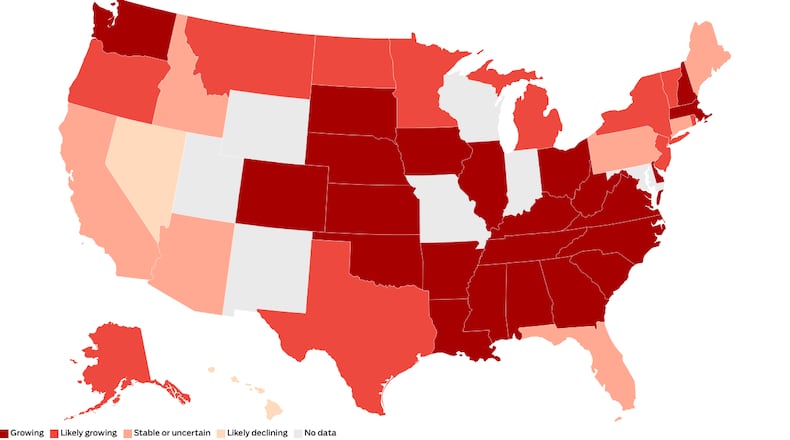COVID-19 infections are growing in Georgia with no indication of this summertime wave easing any time soon, according to the latest figures from the Centers for Disease Control and Prevention.
Cases are growing in 23 states including Georgia, according to the CDC. Cases are “likely” growing in another 11 states. Only two states are listed as “likely” declining. The CDC no longer tracks COVID-19 case numbers but estimates the trend of the virus spread based on emergency room visits.
“It’s not surprising,” said Dr. Felipe Lobelo, an epidemiologist at Kaiser Permanente of Georgia. “Every summer since 2020, we’ve had an uptick or surge during the summer months. Sometimes it’s earlier in the summer, sometimes it’s later, but the same behavioral factors apply here: a lot of people are traveling. A lot of people are going inside because it’s so hot outside.”
Lobelo, however, pointed to a sign the wave could abate over the coming weeks. The “R number,” is a way epidemiologists rate a virus’ ability to spread. The R number represents how many new infections are estimated to stem from a single case. For example, if the R number is 3, then one person with the disease is expected to infect, on average, 3 others. An R number below 1 suggests the number of infections is falling.
The R number for the U.S., while still above 1, has been slipping ever so slightly recently. This could, he said, be a sign that the surge will start slowing down and begin shrinking within about two weeks. But in Georgia, the R number has stayed right around 1.12 for the past month.
Levels of virus found in wastewater samples, often an early signal of rising COVID cases, have also been rising in Georgia according to CDC surveillance. The current viral activity level in Georgia’s wastewater is more than twice what it was this time last year.
And while we contend with summer No. 5 with COVID, the virus and the illnesses it causes have changed. How we live with it has also changed.
The latest iterations of the coronavirus seem to be more contagious, but health experts and doctors are seeing more mild illnesses than earlier versions of the virus. Even relatively mild illnesses can disrupt lives and make people sick — and contagious — for several days.
Mercy Sandberg-Wright of Atlanta said she discovered the summer surge of COVID when trying to buy a COVID test. She called several pharmacies to make sure they had tests for sale, but by the time she drove to each location, they were all gone.
Her husband, Peter Wright, complained of a sore throat and then developed congestion, a cough and fatigue. He tested positive at an urgent care center and was prescribed Paxlovid, an antiviral treatment effective against the virus. As soon as Peter felt symptoms, he and his wife stayed in separate areas of their home. Peter described the symptoms as mild, and he recovered within about a week.
His wife managed to avoid getting sick. Both are in the 70s, and stay up to date on their COVID vaccines. Mercy Wright said she has managed to avoid COVID so far, and she and her husband believe staying up to date on the vaccinations are key to avoiding a serious illness.
The uptick in infections are not translating into a dramatic jump in emergency visits. About 2% of people visiting emergency rooms nationwide were diagnosed with COVID-19 last week, a moderate increase from the previous week, but still considered “low” by the CDC.
In Georgia, 2.15% of emergency room visits last Monday were related to COVID, up from less than 1% at the beginning of July. Last summer the percent of emergency department visits for COVID peaked at 2.78% in late August before dropping back to less than 1% by the end of September.
While some doctors now say the COVID vaccine is less important for those who aren’t at risk for severe illness, Lobelo stressed there’s little question the vaccine continues to be important for older adults and those with pre-existing health conditions. He said those at high risk should seek out the newly updated COVID vaccine once it becomes available in August or September.
The CDC continues to have a general recommendation for everyone six months and older to get an updated COVID shot.
“I think we should maintain a healthy level of humility for both arguments. It’s totally responsible to say, ‘I’m healthy, I’ve received several vaccines already or been infected several times, so I’m definitely not the priority,’” said Lobelo. “But for those groups who are in the vulnerable, high-risk category, this should not be a controversial decision.”
Credit: TNS
Credit: TNS
Even healthy people can benefit, he said.
“I think of it in a very pragmatic sort of way,” he said. “If you are someone who used to getting a flu shot once a year, and values the benefits the flu shot can provide you, you might as well get the COVID shot too.”
At the same time, he sees good reasons for those who are not in a high risk category for getting an updated COVID shot to help boost immunity and help protect others around them.
Keep Reading
The Latest
Featured






